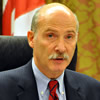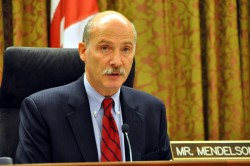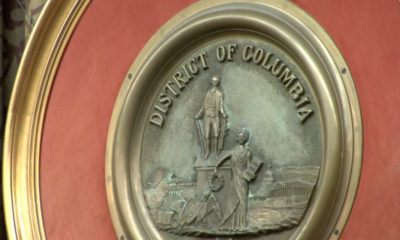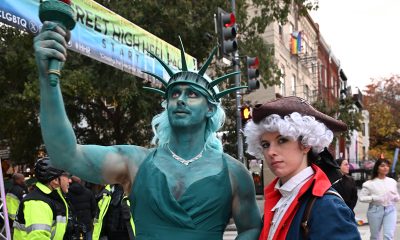Local
Vote on D.C. anti-bullying bill expected in fall
Fate of marriage ‘officiant’ measure unclear


Council member Phil Mendelson chairs a committee overseeing the Marriage Officiant Amendment Act. (Washington Blade file photo)
Action on legislation pending before the D.C. Council that would prohibit bullying in the city’s schools, parks, and libraries, among other places, has been put on hold until the Council returns from its summer recess in September.
A separate bill of interest to the LGBT community that would allow a notary public to perform a civil marriage at a location other than the D.C. courthouse remains stalled in the Council’s Judiciary Committee since the panel held a hearing on the measure last October.
The Bullying and Intimidation Prevention Act of 2011 has strong support in the LGBT community following widely publicized incidents of gay teen suicides linked to school bullying. Nearly all Council members have signed on as co-sponsors or co-introducers of the bill.
But LGBT advocacy groups believe the bill as introduced doesn’t have adequate enforcement and implementation provisions. They are working closely with Council members to prepare one or more amendments to strengthen the bill, according to Rick Rosendall, vice president of the Gay & Lesbian Activists Alliance.
The bill requires the city’s public and charter schools, the Department of Parks and Recreation, the city’s public libraries, and the University of the District of Columbia to adopt “a policy prohibiting harassment, intimidation or bullying” in their respective facilities, buildings and grounds.
The legislation defines harassment, intimidation or bullying as “any gesture or written, verbal or physical act, including electronic communication, that is reasonably perceived as being motivated either by any actual or perceived characteristic, such as race, color, religion, ancestry, national origin, sexual orientation, gender identity and expression, or a mental, physical or sensory handicap, or by any other distinguishing characteristic.”
LGBT youth representatives joined officials from LGBT organizations, including the Gay, Lesbian & Straight Education Network, a national group that monitors anti-LGBT bullying, in testifying for the bill and for amendments to strengthen it at a Council hearing in May.
Meanwhile, supporters of the Marriage Officiant Amendment Act of 2011, which was authored by Council member Mary Cheh (D-Ward 3), say it’s aimed at giving couples – gay or straight – who are interested in a non-religious civil marriage the option of having such a marriage performed at a location outside the D.C. Superior Court building.
Under current city law, civil marriages must be performed at the courthouse by a court-appointed marriage “officiant” unless the parties getting married know a judge and the judge agrees to perform the marriage at another location, such as a banquet hall or a private home.
Backers of the bill say D.C. Superior Court judges, who are authorized to perform marriages under city law, do so only on a limited basis and are not available to most people seeking a civil marriage.
Council member Phil Mendelson (D-At-Large), who chairs the committee overseeing the bill, could not be immediately reached to determine whether he plans to move the bill out of committee for a vote anytime soon.
At the time of the hearing in October, Mendelson told the Blade he believed more research was needed on the bill and he had no immediate plans to call for a vote in committee or before the full Council.
“As far as I know, the notary bill will not be marked up,” gay activist Bob Summersgill told the Blade last week. “The bill is severely flawed and will need to be completely rewritten.”
Summersgill testified in favor of the bill at the October hearing. But he called for major changes that would allow any adult to perform a civil marriage by obtaining a one-day authorization to become a marriage officiant.
Massachusetts and some counties in California have similar one-day officiant laws that allow a couple planning to marry to select a friend or family member or anyone else of their choosing to perform their civil marriage. In Massachusetts the person seeking to perform the marriage must apply in advance and pay a $25 fee for the one-day authorization.
South Carolina, Florida and Maine have laws that allow a notary public to perform civil weddings.
Gay Council member David Catania (I-At-Large) and Council member Jack Evans (D-Ward 2) joined Cheh in co-introducing the D.C. Marriage Officiant Amendment Act last year. Gay Council member Jim Graham (D-Ward 1) and Council member Marion Barry (D-Ward 8) signed on as co-sponsors. Council member Tommy Wells (D-Ward 6) co-sponsored the bill last year but has not signed on as a co-sponsor this year.
Cheh told the Blade in an e-mail that she would consider the changes proposed by Summersgill to broaden the bill to include a one-day officiant provision similar to Massachusetts’ civil marriage law.
“I don’t know exactly why the bill hasn’t moved,” Cheh said. “Council member Mendelson has had a huge volume of stuff to move through his committee, and I have no reason to think he is opposed to the bill,” she said.
Steven Lowe, a D.C. resident who testified in support of the bill at last October’s hearing, said the bill as currently written provides couples seeking a civil marriage an option for having their marriage ceremony outside the courthouse. He describes the courthouse as “bureaucratic” and unappealing to many couples seeking a civil marriage.
Lowe said he doesn’t object to Summersgills’ call for a one-day officiant provision that would be available to all adults.
“But the point for me was to have something less restrictive and a non-religious option” in a location that people can choose, Lowe said. “So I supported the notary public bill because it was at least a move in the right direction.”
District of Columbia
Deon Jones speaks about D.C. Department of Corrections bias lawsuit settlement
Gay former corrections officer says harassment, discrimination began in 1993

Deon Jones says he is pleased with the outcome of his anti-gay bias lawsuit against the D.C. Department of Corrections that ended after five years on Feb. 5 with the D.C. government paying him $500,000 in a settlement payment.
The lawsuit, filed on his behalf by the American Civil Liberties Union of D.C. and the law international law firm WilmerHale, charged that Jones, a Department of Corrections sergeant, had been subjected to years of discrimination, retaliation, and a hostile work environment because of his identity as a gay man in clear violation of the D.C. Human Rights Act.
A statement released by the ACLU at the time the settlement was announced says Jones, “faced years of verbal abuse and harassment, from co-workers and incarcerated people alike, including anti-gay slurs, threats, and degrading treatment.”
The statement adds, “The prolonged mistreatment took a severe toll on Jones’s mental health, and he experienced depression, post-traumatic-stress disorder, and 15 anxiety attacks in 2021 alone.:
Jones said the harassment and mistreatment he encountered began in 1993, one year after he first began work at the Department of Corrections and continued for more than 25 years under six D.C. mayors, including current Mayor Muriel Bowser, who he says did not respond to his repeated pleas for help.
Each of those mayors, including Bowser, have been outspoken supporters of the LGBTQ community, but Jones says they did not intervene to change what he calls the homophobic “culture” at the Department of Corrections.
The Department of Corrections, through the Office of the D.C. Attorney General, which represents city agencies against lawsuits, and the mayor’s office, have so far declined to comment on the lawsuit and the half million-dollar settlement the city offered to Jones, who accepted it.
Among other things, the settlement agreement states that Jones would be required to resign from his job at the Department of Corrections. It also declares that “neither the parties’ agreement nor the District government’s offer to settle the case shall in any way be construed as an admission by the District that it or any of its current or former employees, acted wrongfully with respect to plaintiff or any other person, or that plaintiff has any rights.”
Scott Michelman, the D.C. ACLU’s legal director said that type of disclaimer is typical for parties that agree to settle a lawsuit like this. He said the city’s action to pay Jones a half million-dollar settlement “speaks louder than words.”
With that as a backdrop, Jones reflected on the settlement and what he says was his tumultuous 30-year career as an employee at the D.C. Department of Corrections in a Feb. 9 interview with the Washington Blade.
He and Michelman pointed out that Jones was placed on paid administrative leave in April 2022, one year after his lawsuit was filed. Among his upcoming plans, Jones told the Blade, is to publish a podcast that, among other things, will highlight the hardship he faced at the Department of Corrections and advocate for LGBTQ rights.
BLADE: What are your thoughts on this lawsuit settlement which appears very much in your favor?
JONES: That’s great. I’m happy. I’m glad to resign. It’s been a long time coming. It was the worst time it’s ever been. And I have advocated for the community for many, many years. And not only standing up for my rights but for the rights for others in the LGBTQ community.
And I’m just tired now. And my podcast will start soon. And I will continue to advocate for the community.
BLADE: Can you tell a little about that and when it will begin?
JONES: Once in April, once everything is closed my podcast will be starting. And that’s Deon’s Chronicle and Reveal. Yes, my own podcast.
BLADE: Since we have reported your attorney saying you have been on administrative leave since March of 2022, some in the community might be interested in what you have been doing since that time. Did you get another job or were you just waiting for this case to be resolved?
JONES: I was waiting for this to be resolved. I couldn’t work. That would violate policy and procedures of the D.C. government. So, I could not get another job or anything else.
BLADE: You have said under administrative leave you were still getting paid. You were still able to live off of that?
JONES: Yes, I was able to. Yes, sir. I used to do a lot of overtime. As a zone lieutenant for many years, I have supervised over 250 officers. I’ve also supervised over 25,000 inmates in my 30 years.
BLADE: How many years have you been working for the Department of Corrections?
JONES: It’s 30 years all together. I started down at the Lorton facility. Six facilities — I’ve worked for past directors, deputy directors, internal affairs. I’ve done it all.
BLADE: Do you have any plans now other than doing the podcast?
JONES: Well, to just do my podcast and also to write my book and my memoir inside of the house of pain, the house of shame — what I’ve been through. When I start my podcast off it will be stories — Part 1 through Part 4. And I will go back to the Lorton days all the way up to now. When it first started was sexual harassment and discrimination back down at Lorton. And I mean this has just been the worst time around.
BLADE: So, did you first start your work at the Lorton Prison?
JONES: Yes, I was at the central facility, which was the program institution.
MICHELMAN: Just for context. You may remember this, but the Lorton facility was where D.C. incarcerated people were held. So, that was part of the D.C. Department of Corrections.
BLADE: Yes, and that was located in Lorton, Va., is that right?
JONES: Right.
BLADE: Didn’t that close and is the main incarceration facility is now in D.C. itself?
JONES: Yes. And that closed in 2001.
BLADE: I see. And is the main D.C. jail now at a site near the RFK Stadium site?
JONES: Yes, sir. And next-door is the correctional treatment facility as well.
BLADE: So, are you saying the harassment and other mistreatment against you began back when you were working at the Lorton facility?
JONES: At the Lorton central facility. And they used to flash me too. When I say flash me like the residents, the inmates were flashing. And they [the employees] were flashing.
BLADE: What do you mean by flashing?
JONES: They take their penis out and everything else. I mean the sexual harassment was terrible. And I came out then down there. And I continued to advocate for myself and to advocate for other people who I was told were being picked on as well.
BLADE: As best you can recall, where and what year did that happen?
JONES: That was back in 1993 in April of 1993.
BLADE: The mayor’s office has declined to comment on the settlement and payment the city is giving you. Yet they have always said they have a strong policy of nondiscrimination protections for LGBTQ people in D.C. government agencies. But do you think that was not carried out at the Department of Corrections?
JONES: That’s a blatant reason why — I had 13 anxiety attacks. It was so blatant. Can you imagine? On the airwaves or the walkie-talkies — everybody had a walkie talkie — the captains and the majors and everything. And you transmit it to the command center or something like that. When you finish someone gets on the air and calls you a sissy or a fag.
They received so many complaints, and I also sent the mayor so many emails and begging for help. And they ignored it. They didn’t address any complaints at all. So, that’s bull.
BLADE: But now after you filed your lawsuit and you received this settlement do you think there will be changes there to protect the rights of other LGBTQ employees?
JONES: I hope so, because I have been defending community rights. For many years I have been advocating for different things and different services. And I’ve seen the treatment. There are a lot of mistreatments towards the community over there. And I have taken a stance for a lot of people in the community and protecting their constitutional rights as well as mine.
BLADE: What advice might you have for what the Department of Corrections should do to correct the situation that led to your lawsuit?
JONES: Well, what my advice for the department is they need to go back over their training. And they need to enforce rules against any acts of discrimination, retaliation, or sexual harassment. They need to enforce that. They’re not enforcing that at all. They’re not doing it at all. And this time it was worse than ever, then I’ve ever seen it. That you would get on the walkie talkie and someone would call you a fag or a sissy or whatever else or do evil things and everything. They are not enforcing what they are preaching. They are not enforcing that.
BLADE: Is there any kind of concluding comment you may want to make?
JONES: Well, I hope that this litigation will be a wakeup call for the department. And also, that it will give someone else the motivation to stand up for their rights. I was blessed to have the ACLU and WilmerHale to protect my constitutional rights. So, I am just really happy. So, I’m hoping that others will stand up for their rights. Because a lot of people in the community that worked there, they were actually afraid. And I had some people who actually quit because of the pressure.
Baltimore
‘Heated Rivalry’ fandom exposes LGBTQ divide in Baltimore
Hit show raises questions about identity, cultural representation

By JOHN-JOHN WILLIAMS IV | “Heated Rivalry,” the surprise gay hockey romance that has captivated global audiences and become a cultural phenomenon, has inspired sold-out parties celebrating the characters from the steamy series, including in Baltimore.
For some, love of the show has exposed the loss of a once-vibrant gay nightlife in Charm City and splintered its LGBTQ community. It also brings up layered questions about identity, cultural representation, and the limits of identity politics.
In Baltimore, the majority of the parties also appear to be missing a key ingredient that has been a part of the show’s success: gay men at the helm. Last month, women hosted a dance party at Ottobar, a straight establishment.
The rest of this article can be read on the Baltimore Banner’s website.
Virginia
McPike wins special election for Va. House of Delegates
Gay Alexandria City Council member becomes 8th LGBTQ member of legislature

Gay Alexandria City Council member Kirk McPike emerged as the decisive winner in a Feb. 10 special election for a seat in the Virginia House of Delegates representing Alexandria.
McPike, a Democrat, received 81.5 percent of the vote in his race against Republican Mason Butler, according to the local publication ALX Now.
He first won election to the Alexandria Council in 2021. He will be filling the House of Delegates seat being vacated by Del. Elizabeth Bennett-Parker (D-Alexandria), who won in another Feb. 10 special election for the Virginia State Senate seat being vacated by gay Sen. Adam Ebbin (D-Alexandria).
Ebbin is resigning from his Senate next week to take a position with Virginia Gov. Abigail Spanberger’s administration.
Upon taking his 5th District seat in the House of Delegate, McPike will become the eighth out LGBTQ member of the Virginia General Assembly. Among those he will be joining is Sen. Danica Roem (D-Manassas), who became the Virginia Legislature’s first transgender member when she won election to the House of Delegates in 2017 before being elected to the Senate in 2023.
“I look forward to continuing to work to address our housing crisis, the challenge of climate change, and the damaging impacts of the Trump administration on the immigrant families, LGBTQ+ Virginians, and federal employees who call Alexandria home,” McPike said in a statement after winning the Democratic nomination for the seat in a special primary held on Jan. 20.
McPike, a longtime LGBTQ rights advocate, has served for the past 13 years as chief of staff for gay U.S. Rep. Mark Takano (D-Calif.) and has remained in that position during his tenure on the Alexandria Council. He said he will resign from that position before taking office in the House of Delegates.




















